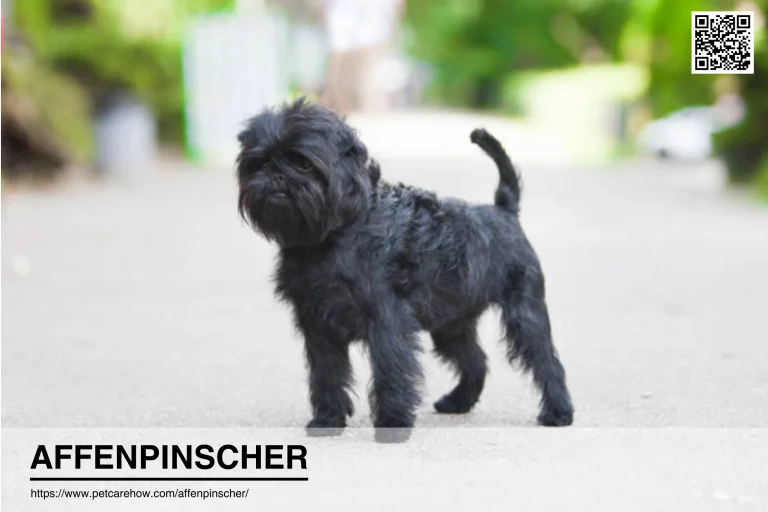The Affenpinscher, often referred to as the “Monkey Dog” due to its distinctive facial expression, is a small yet spirited breed originating from Germany. Known for their wiry coats and playful demeanor, these dogs were initially bred as ratters in the 17th century but have since become beloved companion animals. Standing between 9 to 11.5 inches tall and weighing 7 to 10 pounds, Affenpinschers are characterized by their bold personalities, intelligence, and loyalty. Despite their small size, they are fearless and make excellent watchdogs, always ready to alert their families to any potential threats. With a lifespan of 12 to 15 years, these affectionate and lively dogs are a delightful addition to any household, particularly for those who appreciate their unique charm and comical antics
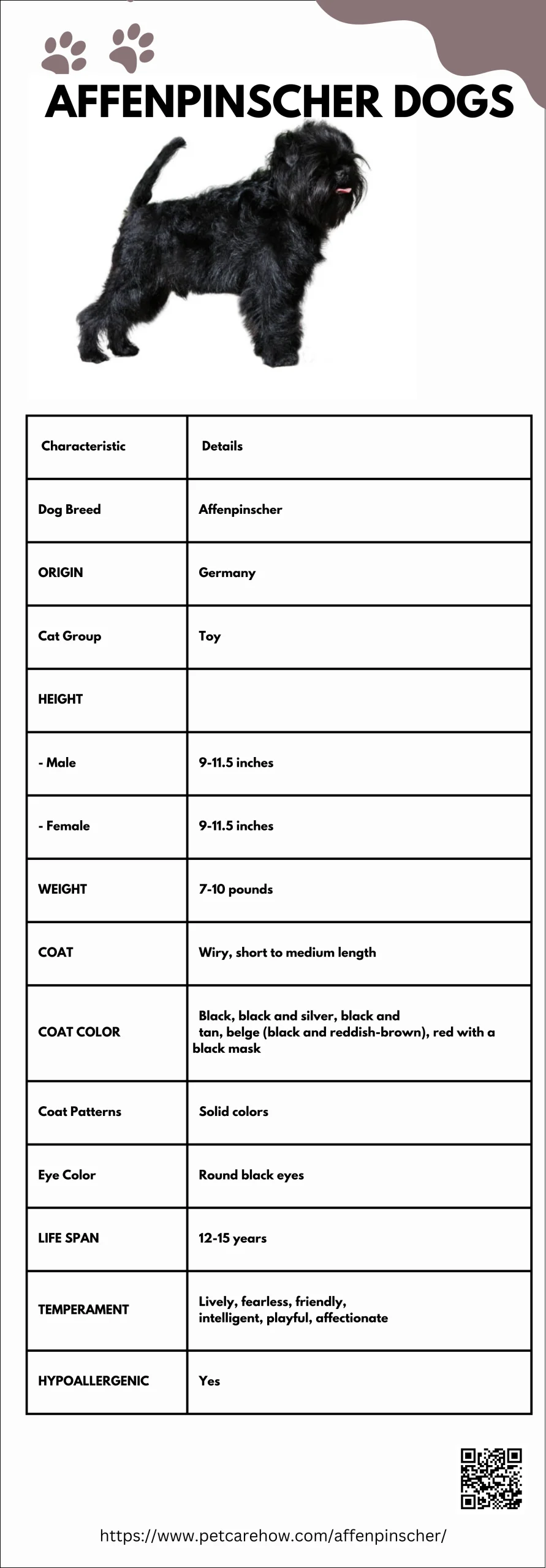
| Characteristic | Details |
| Dog Breed | Affenpinscher |
| ORIGIN | Germany |
| Cat Group | Toy |
| HEIGHT | |
| – Male | 9-11.5 inches |
| – Female | 9-11.5 inches |
| WEIGHT | 7-10 pounds |
| COAT | Wiry, short to medium length |
| COAT COLOR | Black, black and silver, black and tan, belge (black and reddish-brown), red with a black mask |
| Coat Patterns | Solid colors |
| Eye Color | Round black eyes |
| LIFE SPAN | 12-15 years |
| TEMPERAMENT | Lively, fearless, friendly, intelligent, playful, affectionate |
| HYPOALLERGENIC | Yes |
Characteristics of Affenpinscher
| Characteristic | Level |
| Affection Level | Medium |
| Friendliness | High |
| Kid-Friendly | Medium |
| Pet-Friendly | Medium |
| Exercise Needs | Medium |
| Playfulness | High |
| Energy Level | Medium |
| Trainability | Medium |
| Intelligence | Medium |
| Tendency to Vocalize | High |
| Amount of Shedding | Low |
History of Affenpinscher Dog
The Affenpinscher has a rich history dating back several centuries in Germany. Originally bred as ratters to exterminate rodents in homes, stables, and shops, these small, rough-coated dogs were depicted in artworks as early as the 15th century by renowned painters like Durer and Van Eyck. The breed’s name, derived from the German words “Affe” (monkey) and “Pinscher” (terrier), aptly describes their distinctive monkey-like facial features and terrier-like characteristics. While the larger, long-muzzled variety is believed to have evolved into the Miniature Schnauzer, the smaller, round-headed type with a prominent jaw became the modern Affenpinscher. The breed gained popularity in the late 19th and early 20th centuries, particularly among German film stars and fashionable ladies, but its numbers dwindled during the World Wars, necessitating efforts to revive and standardize the breed.
Affenpinscher Dog Care
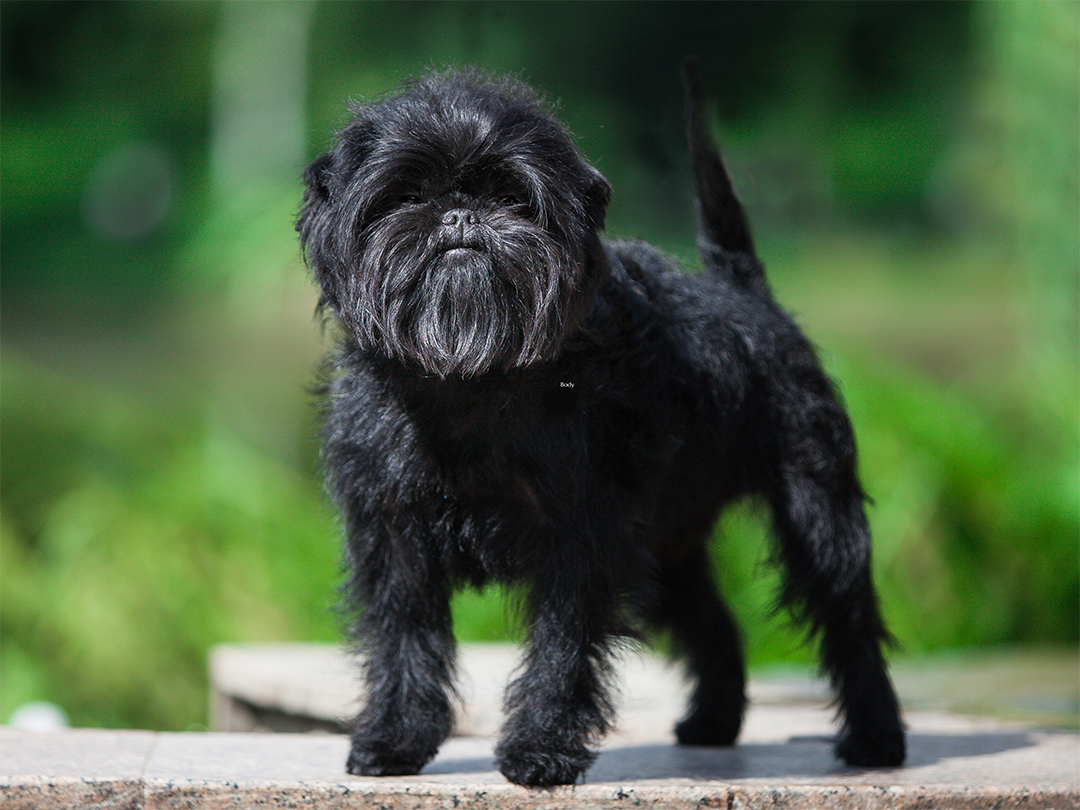
1. Exercise
Affenpinschers are moderately active dogs that require regular exercise to stay healthy and happy. Despite their small size, they have a lot of energy and enjoy activities that challenge them both physically and mentally. A daily routine should include at least 20-40 minutes of exercise, which can be a combination of brisk walks, interactive games, and mental stimulation activities like puzzle toys or agility exercises. These activities help burn off excess energy and prevent boredom, which can lead to destructive behaviors.
2. Grooming
Grooming an Affenpinscher involves regular maintenance to keep their thick, wiry coat in good condition. Brushing should be done at least once or twice a week using a slicker brush and a metal comb to remove loose fur and prevent matting. Bathing is recommended every four to six weeks, and the coat should be trimmed every six to eight weeks to maintain its shape. Special attention should be given to the hair around the face, beard, and legs. Additionally, regular nail trimming, ear cleaning, and dental care are essential to prevent infections and dental issues.
3. Training
Training an Affenpinscher requires patience, consistency, and a firm yet gentle approach due to their intelligent but independent nature. Early socialization is crucial to help them become well-adjusted adults. Basic commands like “sit,” “stay,” and “come” should be taught using positive reinforcement techniques such as treats and praise. Short, frequent training sessions are more effective as Affenpinschers can have short attention spans and may become stubborn if sessions are too long. Mental stimulation through cognitive challenges and interactive games is also important to keep them engaged and prevent behavioral issues.
Common Health Problems and Preventive Measures of Affenpinscher Dog
Affenpinschers, while generally healthy, are prone to several specific health issues. Here is a detailed overview of the common health problems associated with this breed:
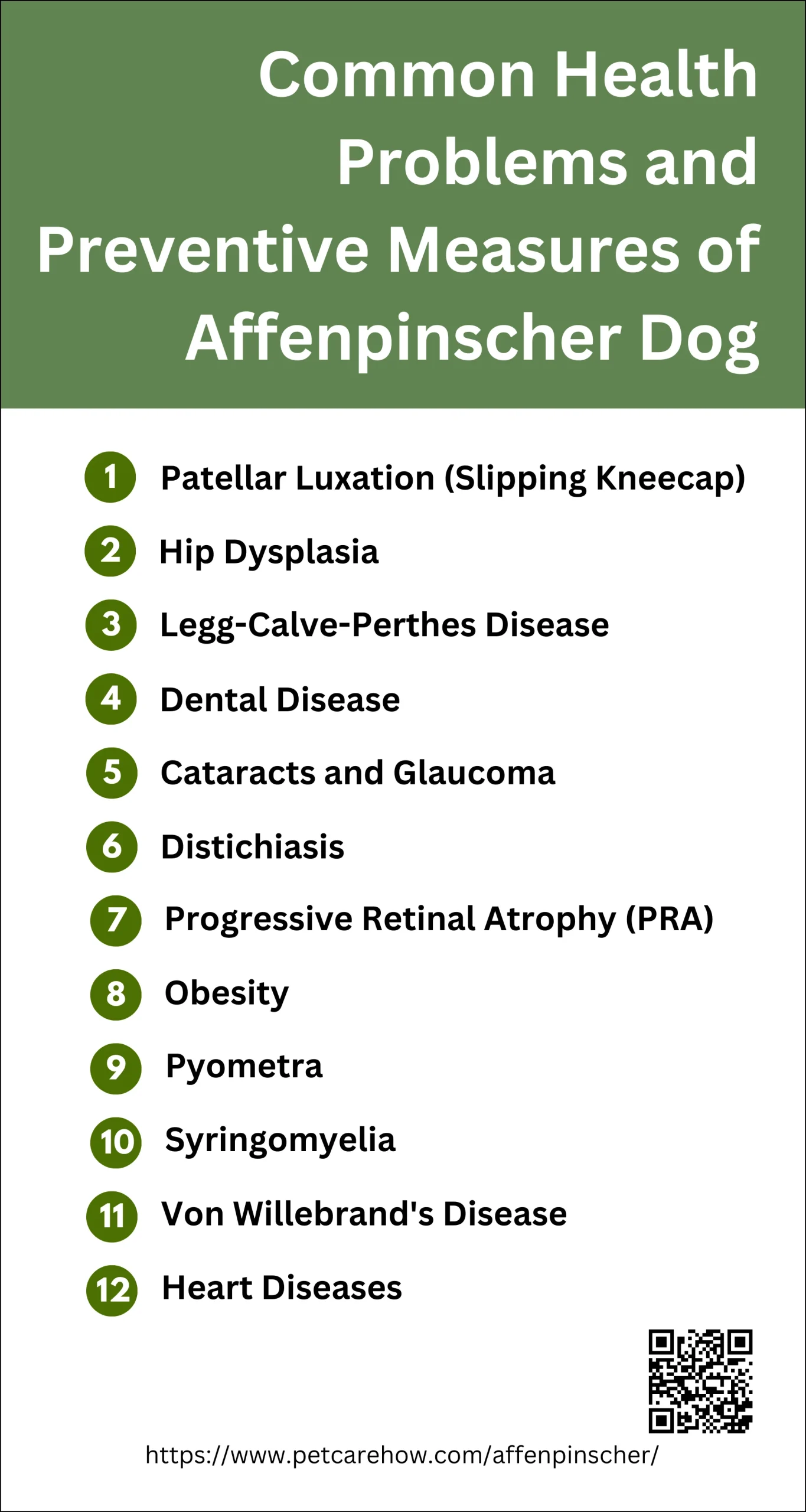
1. Patellar Luxation (Slipping Kneecap)
Patellar luxation, also known as a slipping kneecap, is a common orthopedic issue in Affenpinschers. This condition occurs when the patella (kneecap) dislocates or moves out of its normal position, causing pain and lameness. It can be congenital or result from trauma. Dogs with patellar luxation may exhibit an abnormal gait, often described as a skip or hop.
Preventive Measures: To prevent patellar luxation, ensure your Affenpinscher maintains a healthy weight to reduce stress on the joints. Regular, moderate exercise can help strengthen the muscles around the knee. Genetic screening of breeding dogs can also help reduce the incidence of this condition in future generations.
2. Hip Dysplasia
Hip dysplasia is a hereditary condition where the hip joint does not fit properly into the hip socket, leading to joint instability, pain, and arthritis over time. This condition can cause significant discomfort and mobility issues in Affenpinschers.
Preventive Measures: Preventive measures include maintaining a healthy weight and providing regular, low-impact exercise to keep the joints flexible. Feeding a balanced diet rich in nutrients that support joint health is also beneficial. Breeders should screen for hip dysplasia and avoid breeding affected dogs.
3. Legg-Calve-Perthes Disease
Legg-Calve-Perthes disease is a degenerative condition affecting the femoral head (the ball of the hip joint), leading to its collapse and causing pain and lameness. This condition typically appears in young dogs and can be confused with hip dysplasia.
Preventive Measures: Early diagnosis and surgical intervention can help manage this condition. Ensuring that breeding dogs are screened for this disease can help reduce its occurrence. Post-surgery, physical therapy can aid in recovery and improve mobility.
4. Dental Disease
Dental disease is prevalent in Affenpinschers, with issues ranging from tartar buildup and gingivitis to periodontal disease. If left untreated, dental problems can lead to tooth loss and systemic health issues affecting the heart, liver, and kidneys.
Preventive Measures: Regular dental care, including daily brushing with dog-safe toothpaste and professional cleanings, is essential. Providing dental chews and a diet that promotes oral health can also help prevent dental disease.
5. Cataracts and Glaucoma
Affenpinschers are prone to eye conditions such as cataracts, which cause the lens to become cloudy, and glaucoma, which increases intraocular pressure and can lead to blindness. Both conditions can significantly impair vision and quality of life.
Preventive Measures: Regular veterinary eye exams are crucial for early detection and management of these conditions. Surgical options are available for cataracts, while glaucoma may require medication or surgery to manage intraocular pressure.
6. Distichiasis
Distichiasis is a condition where extra eyelashes grow inside the eyelid, irritating the eye and potentially causing corneal ulcers and chronic pain. This condition is more common in Affenpinschers than in other breeds.
Preventive Measures: Regular eye examinations can help detect distichiasis early. Treatment options include removing the extra eyelashes through surgery or other medical procedures to prevent further irritation and damage.
7. Progressive Retinal Atrophy (PRA)
PRA is an inherited disease that causes the gradual degeneration of the retina, leading to blindness. Early symptoms include night blindness and dilated pupils, typically appearing between three to five years of age.
Preventive Measures: Genetic testing can identify carriers of the PRA gene, helping breeders avoid producing affected puppies. While there is no cure for PRA, early diagnosis can help manage the condition and adapt the dog’s environment to their changing vision.
8. Obesity
Obesity is a significant health concern for Affenpinschers, leading to various complications such as joint problems, metabolic disorders, and heart disease. Overweight dogs are at higher risk for developing other health issues.
Preventive Measures: Preventing obesity involves providing a balanced diet and ensuring regular exercise. Avoid overfeeding and limit treats. Regular weight checks and consultations with a veterinarian can help manage and prevent obesity.
9. Pyometra
Pyometra is a severe uterine infection that can be life-threatening if not treated promptly. It typically occurs in unspayed female dogs and can cause symptoms such as lethargy, fever, and a foul-smelling vaginal discharge.
Preventive Measures: The most effective preventive measure is spaying female dogs, which eliminates the risk of pyometra. Regular veterinary check-ups can help detect any early signs of reproductive health issues.
10. Syringomyelia
Syringomyelia is a condition where fluid-filled cavities develop within the spinal cord, causing pain and neurological deficits. It is a serious condition that can significantly affect an Affenpinscher’s quality of life.
Preventive Measures: Early diagnosis through MRI scans can help manage the condition. Treatment options include medications to reduce pain and inflammation, and in severe cases, surgery may be necessary. Breeding dogs should be screened to reduce the incidence of this condition.
11. Von Willebrand’s Disease
Von Willebrand’s disease is a genetic blood-clotting disorder that can lead to excessive bleeding from minor injuries or during surgery. It is a concern in Affenpinschers and can complicate medical procedures.
Preventive Measures: Genetic testing can identify carriers of the disease, helping breeders avoid producing affected puppies. Dogs diagnosed with the condition should be managed carefully to avoid injuries and monitored closely during any surgical procedures.
12. Heart Diseases
Affenpinscher Dogs can suffer from various heart conditions, including heart murmurs and congenital defects like patent ductus arteriosus. These conditions can lead to heart failure if not managed properly.
Preventive Measures: Regular veterinary check-ups, including heart examinations, can help detect heart conditions early. Maintaining a healthy weight and providing a balanced diet can support heart health. Breeding dogs should be screened for heart conditions to reduce the risk in offspring.
How to feed Affenpinscher Dogs
Here are some tips for feeding Affenpinscher dogs:
Puppies (up to 12 months)
- Frequency: 3-4 meals per day
- Portion Size: Adjust based on weight and activity level
- Recommended Foods: Puppy-specific formulas like Pro Plan Dry Puppy Food or Small Breed Complete Health Puppy Turkey, Oatmeal & Salmon Meal Recipe Dry Dog Food.
Adults (1-7 years)
- Frequency: 2 meals per day
- Portion Size: Approximately 2 cups of food per day, divided into two meals.
- Recommended Foods: High-quality, moderate-calorie dog food such as Blue Buffalo® Chicken & Brown Rice Toy Breed Adult Dog Food or Purina® Pro Plan Adult Toy Breed Chicken & Rice Formula Dry Dog Food.
Seniors (7+ years)
- Frequency: 2 meals per day
- Portion Size: Adjust based on activity level and health status
- Recommended Foods: Senior-specific formulas like Life Protection Formula Small Breed Senior Chicken & Brown Rice Recipe Dry Dog Food.
Foods to Avoid for Affenpinscher Dogs
When it comes to feeding Affenpinscher dogs, it’s crucial to avoid certain foods that can be harmful to their health. Here is a comprehensive list of foods to avoid:
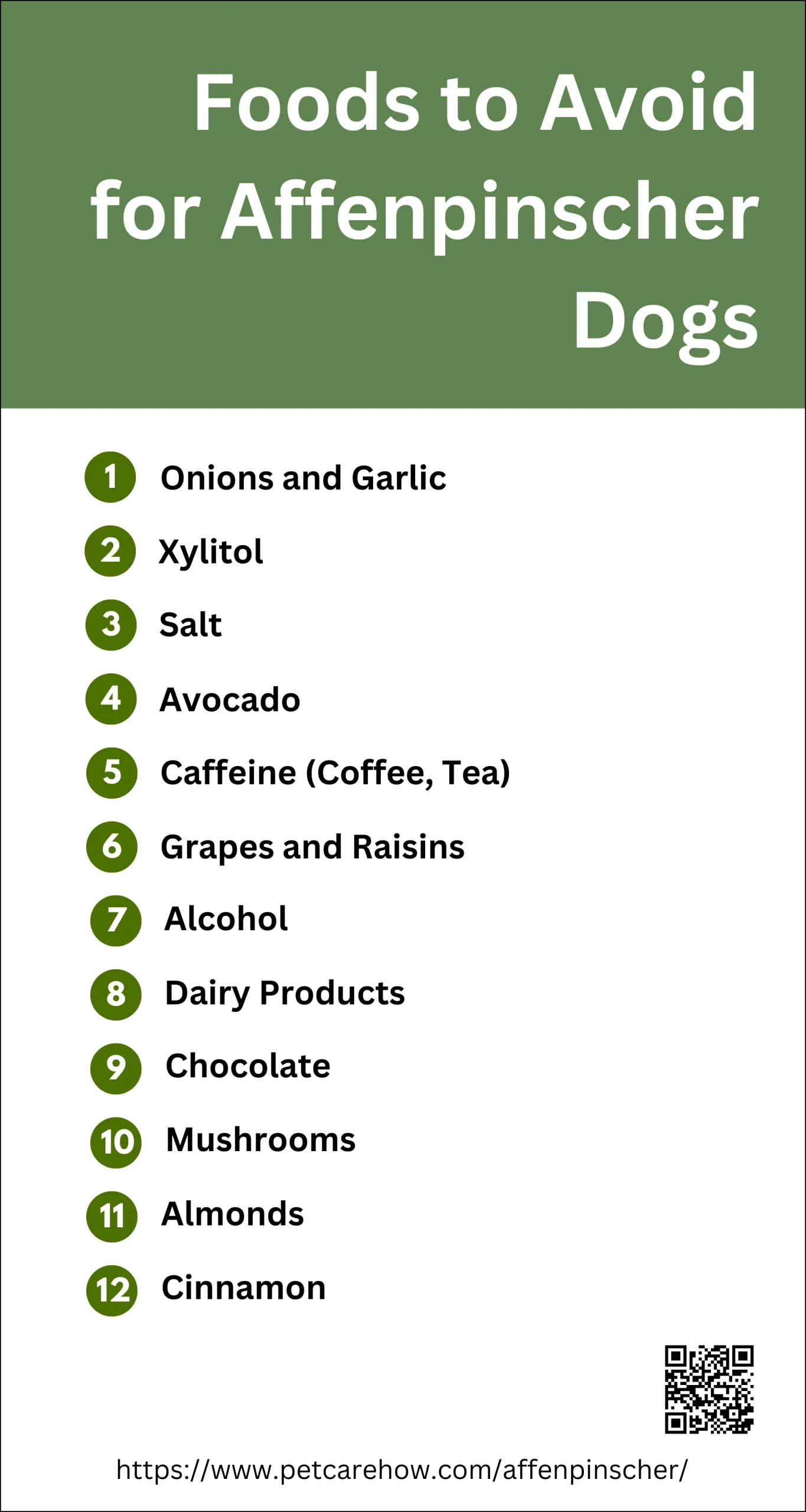
- Onions and Garlic: These can damage a dog’s red blood cells, leading to anemia.
- Xylitol: This sugar substitute can cause a rapid release of insulin, leading to hypoglycemia, seizures, and liver failure.
- Salt: High salt intake can lead to hypertension and other health issues.
- Avocado: Contains persin, which can cause vomiting and diarrhea in dogs.
- Caffeine (Coffee, Tea): Can be toxic and lead to restlessness, rapid breathing, heart palpitations, and muscle tremors.
- Grapes and Raisins: Can cause kidney failure in dogs.
- Alcohol: Even small amounts can cause significant health issues, including vomiting, diarrhea, decreased coordination, and central nervous system depression.
- Dairy Products: Many dogs are lactose intolerant, and dairy can cause digestive upset.
- Chocolate: Contains theobromine, which is toxic to dogs and can cause heart problems, muscle tremors, or seizures.
- Mushrooms: Certain types can be toxic and cause severe health issues.
- Almonds: Can cause gastrointestinal distress and are a choking hazard.
- Cinnamon: Can irritate the dog’s mouth and potentially lower blood sugar levels.
Pros of Adopting Affenpinscher Dogs
Affenpinschers are a delightful breed known for their loyalty, intelligence, and playful nature. These small dogs, often referred to as “monkey dogs” due to their expressive faces and curious demeanor, make excellent companions for the right household. One of the primary advantages of adopting an Affenpinscher is their suitability for apartment living. Their small size and moderate exercise needs mean they can thrive in smaller spaces, provided they get regular walks and playtime. Additionally, Affenpinschers are known for their low shedding and relatively low grooming needs, although they do require regular brushing to maintain their wiry coat.
Another significant benefit is their alert and protective nature. Despite their small stature, Affenpinschers are excellent watchdogs, quick to alert their owners to any perceived threats. Their fearless and confident personality often makes them seem larger than life, and they are known to be quite entertaining with their antics and playful behavior. Moreover, Affenpinschers are generally healthy dogs with a lifespan of 10-12 years, and with proper care, they can be a long-term companion.
Cons of Adopting Affenpinscher Dogs
While Affenpinschers have many endearing qualities, potential owners should be aware of some challenges associated with the breed. One of the primary cons is their stubborn and independent nature, which can make training a bit challenging. They require consistent, positive reinforcement training methods and may not be the best choice for first-time dog owners. Additionally, Affenpinschers are known to be difficult to housebreak, often requiring extended periods of crate training and supervision to prevent accidents in the house.
Another consideration is their fragility and need for constant supervision. Due to their small size, Affenpinschers can be easily injured by rough handling or accidental falls, making them less suitable for households with young children or larger pets. They also have a high prey drive, which can make them unsuitable for homes with smaller pets like rodents. Furthermore, Affenpinschers are prone to certain hereditary health issues such as patellar luxation, hip dysplasia, and eye diseases, which can lead to significant veterinary expenses.
Lastly, their territorial and sometimes aggressive behavior towards other dogs and strangers can be a challenge. Without proper socialization, Affenpinschers may become overly protective and exhibit excessive barking. Potential owners should be prepared to invest time in socializing their Affenpinscher to ensure they grow up to be well-rounded and friendly dogs.
Where to Adopt or Buy a Affenpinscher Dogs in US
Adopting or buying an Affenpinscher dog in the United States can be done through several reputable channels. Here are some options:
1. Affenpinscher Rescue of America
This organization specializes in rescuing Affenpinschers and finding them loving homes. They have a network of volunteers across the country.
2. Petfinder
A popular website where you can search for Affenpinschers available for adoption from various shelters and rescue groups across the US.
3. Adopt-a-Pet
Another comprehensive resource for finding Affenpinschers available for adoption in shelters and rescue organizations.
The AKC Marketplace is a trusted resource for finding reputable Affenpinscher breeders in the US.
5. PuppySpot
A platform that connects prospective dog owners with vetted breeders.
6. Good Dog
This site helps you find Affenpinscher puppies from responsible breeders.

